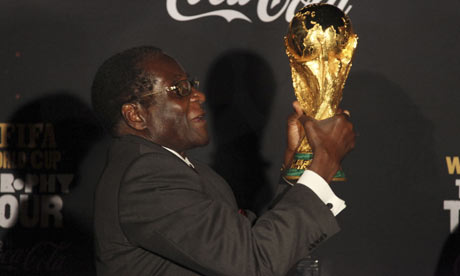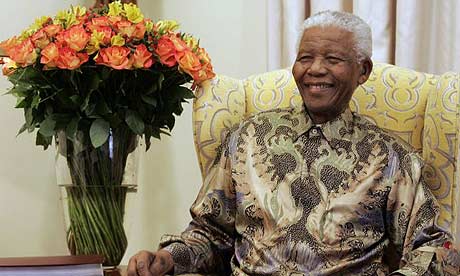By BARRY BEARAK 
European Pressphoto Agency
Supporters of the African National Congress protested outside South Africa's Bloemfontein Regional Court in October, opposing the pardon of the three students charged with demeaning black employees on a video.
BLOEMFONTEIN, South Africa — For a speech about reconciliation it could hardly have been more divisive. Jonathan D. Jansen, the new head of the University of the Free State, spoke of the “place of infamy” just 100 yards behind him, the residence hall where four white students last year made a racist video that incited outrage across the country.
Those students had been expelled, but now the new rector announced that they were welcome to return, pardoned of any further campus discipline. The young men may have been racially troubled, he explained, but the bigger problem lay with the university, which itself was racist.
Moses Masitha, the student body president, was seated just a few feet away as Mr. Jansen, mellifluous as he is provocative, delivered his 4,100-word inaugural address. “It was a good speech until he said he was going to drop the charges and then my head just sank,” he said. “You knew there was going to be a backlash. I wondered, ‘Has he spoken to anyone about this?’ ”
The video, meant to protest the idea of racial integration in student housing, showed a young man apparently urinating into a bowl of stew. The food was then served to five black house cleaners — known in the dorms as “squeezas” — as they guilelessly cooperated in a mock initiation.
Once transferred to a computer, the video made the digital leap from an inside joke in a single dormitory to an international scandal on the World Wide Web. Fifteen years after apartheid, South Africa was left to ponder not only the ghosts of its racist past but also the demons of its racist present.
And now Mr. Jansen, the first black man to lead the 27,000-student, 105-year-old university, was inviting back the culpable whites without even demanding an apology.
“Those boys treated us like we were no more than toilets and now we are being treated that way again by Jonathan Jansen,” one of the workers, Rebecca Adams, complained.
Another of the humiliated workers, Mittah Ntlatseng, said: “These boys have to be trained that we are human beings just like them. Here I am, taking pills for blood pressure and stress. Does Jansen care about that?”
Mr. Jansen’s Oct. 16 “gesture of racial reconciliation,” which included a promise of reparations for the workers, was in most ways largely symbolic.
Two of the four students had graduated before the video went viral. The two others were unlikely to return, Mr. Jansen said in an interview. Criminal prosecution of the four is continuing.
But his gesture — the audacity of his forgiveness — dominated South Africa’s headlines for weeks, firing a controversy that continues to emit heat.
Mr. Jansen most certainly has his champions. He was already a highly regarded educator, a Fulbright scholar with a Ph.D. from Stanford. Now he is also praised for his courage.
Archbishop Desmond Tutu, a winner of the Nobel Peace Prize, called him a “great man” whose inauguration speech displayed the bold and merciful spirit of Jesus. “Forgiveness is not for sissies,” the archbishop said.
But many others considered Mr. Jansen’s action to be insensitive and arrogant. Who was he to pardon those who had blackened the eye of the nation?
Themba Maseko, the chief government spokesman, said that the welfare of the perpetrators had been given preference over that of the victims. Students, primarily blacks, marched on the campus’s main building and demanded the rector’s resignation. Thabo Meeko, the local chairman of the governing party’s youth league, said Mr. Jansen should be shot and killed like a criminal.
These past few weeks, the rector has agreed to hold talks with anyone who wants to discuss his decision, “to try to find consensus on a way forward.” He looks for ways to further explain his thinking.
Mr. Jansen arrived on campus in July. While delightfully picturesque, the university, located in this city in the nation’s central farm belt, is regrettably segregated, Mr. Jansen said in an interview. Courses are taught in two languages. Whites gravitate to classes in Afrikaans, the mother tongue of the descendants of Dutch settlers. Blacks, by and large, attend classes conducted in English.
“I asked to see the choir, and they came to me with two choir directors, the black conductor doing black music and the white conductor doing European music,” Mr. Jansen said. “I go to the senate, which is the academic body of the university, and it’s all white except for two or three guys from Ghana or someplace. And I looked at this and said, ‘Oh my God, no wonder we have this problem.’ We were sitting on a time bomb.”
Mr. Jansen, 53, speaks in a theatrical style, bringing to mind in both charisma and bulk the actor James Earl Jones.
His latest book, “Knowledge in the Blood,” explores the inherited beliefs of the nation’s white students. Many grew up in an Afrikaner culture that is frequently out of step with post-apartheid South Africa, he writes. These young people are often desperate to preserve their culture and language. Churches and schools are considered last bastions of a way of life.
Speaking of his initial days on campus, Mr. Jansen tells the story of white students who asked if they could say a blessing for him. “So off I go” to their church, he said, “and I see a bunch of black kids with Bibles going in the other direction. I jumped out of my car and said, ‘Excuse me, where are you going?’ ” The blacks were going to their own church.
“So the whole setup — spiritually, socially, culturally, academically — has been to be separate, and no one has done anything about it,” he said.
In this, the campus here is hardly alone. Last year’s scandal provoked a government inquiry into racism on university campuses. It concluded that the problem was pervasive: more needed to be done to challenge misconceptions and prejudices, especially among young Afrikaners.
At the University of the Free State, the previous rector had tried a gradual approach to integrating the residences. For the most part, black students had been willing to live in predominantly white dorms but the same was not true the other way around. White students moved off campus instead.
In his speech, Mr. Jansen announced that he would be more insistent. A new school year begins in January, and the residences are to be integrated on a 50-50 basis for all incoming freshmen, he said. Part of a university education will be whites and blacks learning how to live together.
To accomplish that, the culture of the residences must change, he added. The “mindless rituals” of the Afrikaner students will be forbidden: the hazing and the enforced deference, with younger housemates made to refer to older ones as “uncle.”
Whites are generally fearful of what is to come. “Why are we being made to give up our traditions?” asked Christiaan Steenkamp, a white student living in an overwhelmingly white residence hall. “It’s not races that are clashing; it’s cultures. We should be allowed to keep our culture.”
He thought hard to find an example. “Blacks are louder than whites,” he said. “That’s not race. It’s culture. It’s the way they are. Why can’t Jansen recognize that and quit treating us like we’re a bunch of racists?”
Source : http://www.nytimes.com/2009/11/18/world/africa/18safrica.html?_r=2







